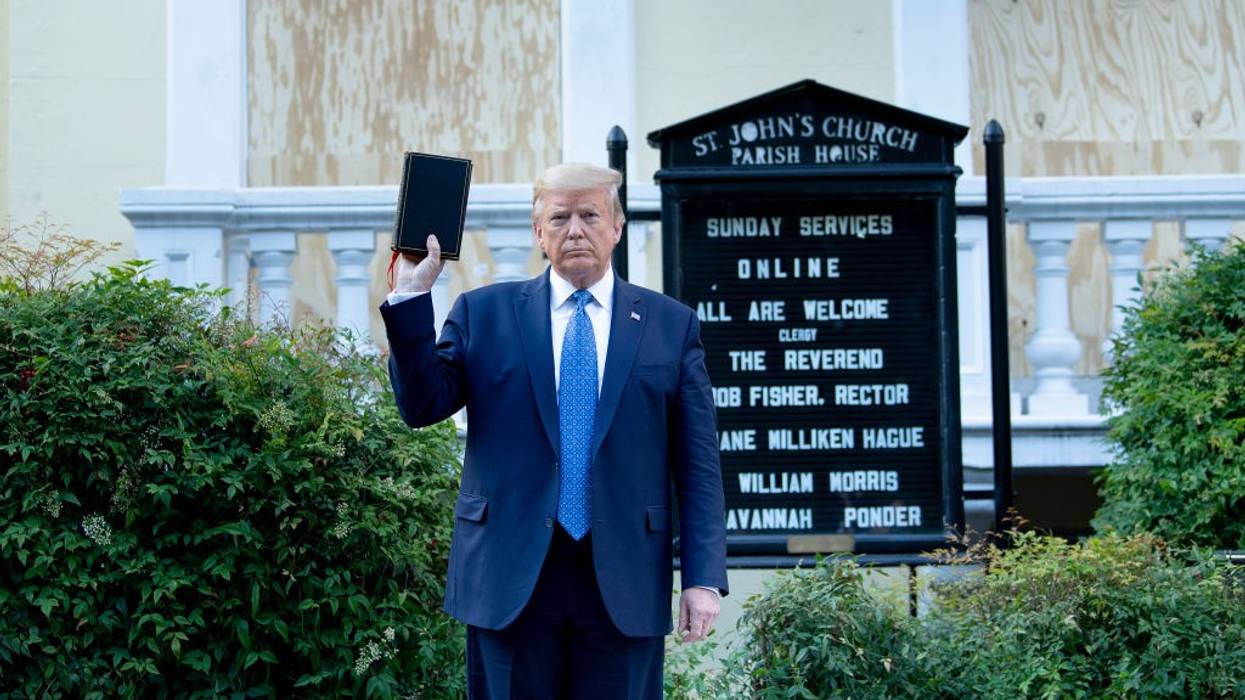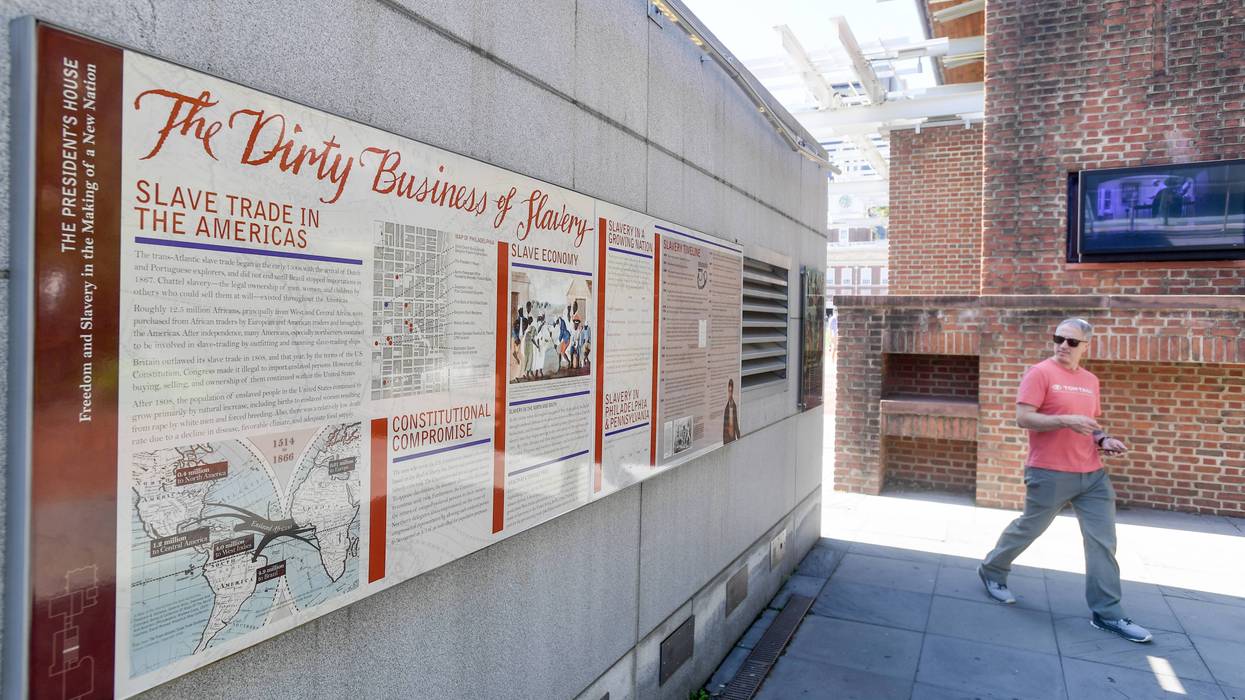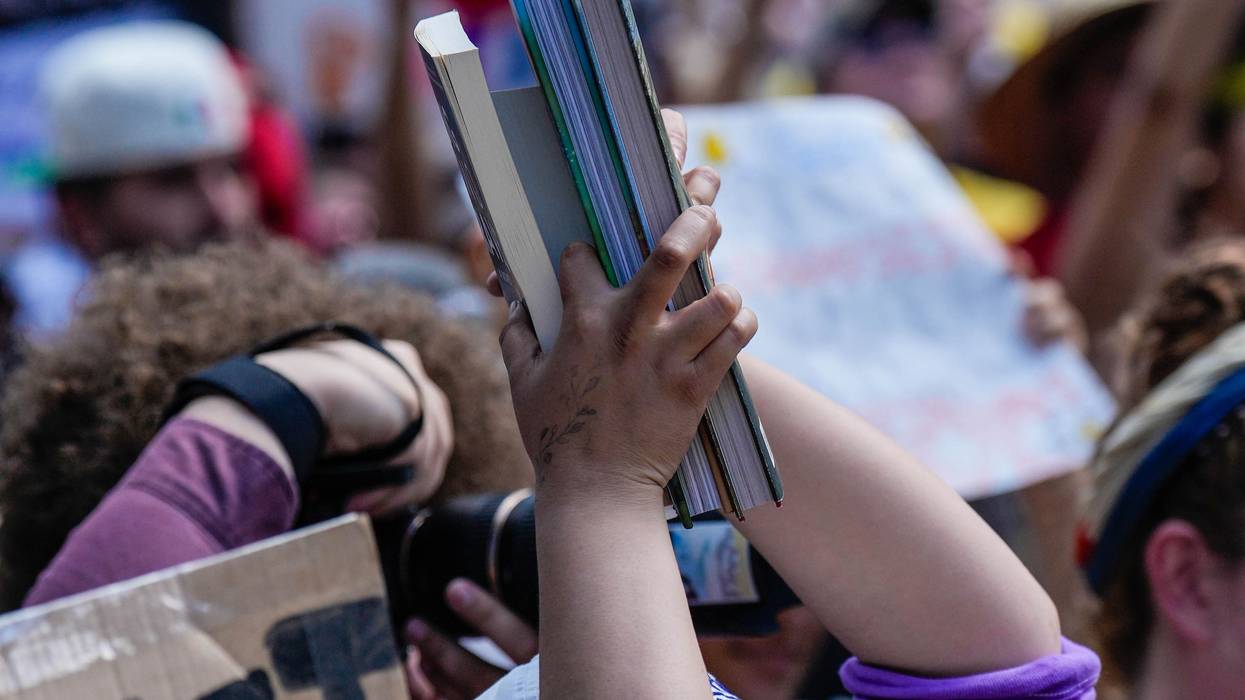MAGA Is Anti-Black
No matter what Trump or his allies allege, the video depicting the Obamas as apes is entirely consistent with their racist worldview; for them, Black is ugly, dangerous, and savage, while white is beautiful, safe, and civilized.
On February 5, a video was posted on President Donald Trump’s Truth Social account depicting former President Barack Obama and former First Lady Michelle Obama as apes in a jungle. The racist depiction of Black people as primates dates back centuries. It is meant to represent them as ugly, savage, and unintelligent—as fundamentally incapable of building a human (white) civilization.
The post was deleted 12 hours later. The White House initially blamed an unnamed staffer for posting it. One White House adviser told reporters, “The president was not aware of that video, and was very let down by the staffer who put it out.” Apparently, they forgot that Trump himself had claimed that only he and White House Deputy Chief of Staff Dan Scavino have access to his social media account.
Later that day, Trump admitted that he knew about the video before its posting. He told reporters, “I looked at the beginning of [the video]. It was fine.” He then added, “Nobody knew that that was at the end. If they would have looked, they would have had the sense to take it down.” Neither the current president of the United States nor his staff is apparently capable of watching a 1-minute video before posting it.
Trump refused to apologize, insisting that he “didn’t make a mistake.”
In some respects, Leavitt is right—that Truth Social post shouldn’t surprise anyone. Trump is the nation’s Racist-in-Chief.
Notably, even conservatives condemned the post (albeit meekly). Sen. Tim Scott (R-SC) posted on Twitter-X that this is “the most racist thing I’ve seen out of this White House.” Sen. Susan Collins (R-Maine) shared Scott’s post, writing, “Tim is right. This was appalling.” Sen. Dan Sullivan (R-Alaska) similarly wrote: “This post was offensive. I’m glad the White House took it down.”
Democrats, by contrast, used stronger language. House Minority Leader Hakeem Jeffries (D-NY) said, “Fuck Donald Trump and his vile, racist, and malignant behavior.” Finally, bipartisanship has been achieved!
Despite this outcry, the White House was quick to dismiss the post as being anything newsworthy. White House Press Secretary Karoline Leavitt demanded that journalists “please stop the fake outrage and report on something today that actually matters to the American public.”
MAGA and Anti-Black Racism
In some respects, Leavitt is right—that Truth Social post shouldn’t surprise anyone. Trump is the nation’s Racist-in-Chief. It’s a slow day indeed if that video is the only racist thing Trump did all day.
In recent months, he has referred to Rep. Ilhan Omar (D-Minn.), a sitting Black congresswoman, as “a disgusting person, a loser,” and “garbage.” Trump says that she, a US citizen, “should be thrown the hell out of our country.” To emphasize, not her country, but “our country.”
More broadly, he says that Somalis are “low IQ people” and that Somalia is “barely a nation.” It “stinks” and is “filthy, dirty, disgusting, ridden with crime.” For Trump, Somalis are savage, ugly, uncivilized, and unintelligent people—fundamentally distinct from the “nice people” from civilized societies like Denmark, Norway, and Sweden. Notice the direct parallels between how Trump explicitly describes Somalis on the one hand, and the underlying racist meaning behind comparing Black people to primates on the other. Trump is applying the exact same set of stereotypes in both instances.
For MAGA Republicans, that success is always vulnerable to the threat of “foreign cultures” and Black immigrants, which in this case include both Ilhan Omar and Barack Obama.
Somalia is not the only example. He refers to Haiti as a “shithole” and “hellhole.” That Haitians are “eating the dogs. They’re eating the cats.” This narrative—not only wildly racist, but demonstrably false—was amplified by several Republicans, including Rep. Tom Tiffany (R-Wis.), Representative Andy Biggs (R-Ariz.) and then-Vice President-Elect JD Vance.
Trump’s racism is not an anomaly among MAGA Republicans. Homeland Security Adviser Stephen Miller remarks, “If Somalians cannot make Somalia successful, why would we think that the track will be any different in the United States? If Libya keeps failing, if the Central African Republic keeps failing, if Somalia keeps failing, right? If these societies all over the world continue to fail, you have to ask yourself, […] what do we think is going to happen?" For Miller, no matter where those people go, the result will be the same: “consistent high rates of welfare use, consistent high rates of criminal activity, consistent failures to assimilate.” Test scores will also consistently drop: “If you subtract immigration out of test scores, all of a sudden our test scores skyrocket!” Like Trump, for Miller, Africans and their descendants are incapable of building a human (white) civilization.
Indirectly, Trump applies this standard to Obama too. Per Trump’s birther conspiracy theory, Obama was born in Kenya. At the same time he promoted that lie, Trump insisted that Obama allowed the US to collapse to the level of “a third world country.” Taken together, from Trump’s perspective, Obama is an African immigrant whose “destructive” policies led to the country “dying.” This is precisely what he and others in his administration allege that African immigrants always do.
A MAGA Black History Month
One might (confusedly) object that all of this is xenophobia, not anti-Black racism specifically—truly a distinction without a difference.
On February 3, Trump issued a proclamation emphasizing that “the history of black Americans is an indispensable chapter in our grand American country.” Thus, he calls upon “public officials, educators, librarians, and all the people of the United States to observe [Black History Month] with appropriate programs, ceremonies, and activities.”
Yet, this objection overlooks a crucial detail: Trump’s proclamation is explicitly not a recognition of diversity—“This month, however, we do not celebrate our differences.” For Trump, Black History Month is not a celebration of Black people, but rather of the ability of “black American heroes” to successfully embrace and defend the “very special culture” that America and Europe inherited. Importantly, for Trump and his allies, the values, beliefs, and principles of that special culture are uniquely white.
This is the white-washed version of Black History Month that MAGA recognizes—one where Black people’s contributions to America are completely divorced from their lived experiences; where it is white values that abolish slavery, end discrimination, and save the nation.
Trump is not honoring Black arts, culture, or philosophy. He is calling on us to remember Black people’s “enduring commitment to the American principles of liberty, justice and equality.” It is those principles that freed the Western Hemisphere from “empires, ended slavery, saved Europe, put a man on the moon, and built the freest, most just, and most prosperous society ever known to mankind.” Black patriots like Coretta Scott King, Booker T. Washington, and Thomas Sowell “fiercely defended the values set forth in the Declaration of Independence and helped to make our Republic the greatest country in the history of the world.”
For Trump, America’s “bedrock belief in equality” is inextricably tied to the nation’s Christian foundation and the belief that all are equal under God. It is that belief “that drove black American icons to help fulfill the promise of [America’s] principles.”
What Trump is expressing here is entirely consistent with the racist worldview that he and other MAGA Republicans endorse. Black values and cultures ruin societies, while white values uplift them. This is why Haiti, Somalia, Central African Republic, and Libya fail to develop, while the US thrives. If Black people succeed, it is because they have championed Christian and Enlightenment (white) principles and values. This is the white-washed version of Black History Month that MAGA recognizes—one where Black people’s contributions to America are completely divorced from their lived experiences; where it is white values that abolish slavery, end discrimination, and save the nation.
For MAGA Republicans, that success is always vulnerable to the threat of “foreign cultures” and Black immigrants, which in this case include both Ilhan Omar and Barack Obama. This vulnerability is why US cities like Baltimore, where more than half the residents are Black, can become “dangerous,” “disgusting, rat and rodent infested mess.”
No matter what Trump or his allies allege, the video depicting the Obamas as apes is entirely consistent with their racist worldview. In every instance, their comments reflect the same underlying dichotomy: Black is ugly, dangerous, and savage, while white is beautiful, safe, and civilized. This is true whether they explicitly state it or metaphorically represent it.
It is this racism that leads Trump to blame Black Americans for violent crimes. It is this racism that leads the Trump administration to invade Minnesota. It is this “racial and national origin animus” that spurs their desire to end Temporary Protection Status for Haitians. It is this racism that makes everyone, regardless of race or citizenship status, vulnerable to the Trump administration’s Christian and ethnonationalist agenda. It is this racism that we must all resist.


